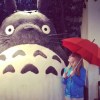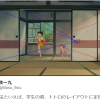These words may seem to be English in origin, but they’re definitely Japanese words.
Have you ever spoken with someone who’s grown up speaking Japanese and they suddenly whip out a word that they keep insisting is English, but you have no idea what it’s supposed to mean? It’s as if two English words have been squashed together, or a single word has been given an entirely new definition.
A quick example of this would be “my boom”. If you’ve been asked what your “my boom” is and have no idea what that means (something like “what you are extremely interested in right now”), welcome to the wonderful world of wasei eigo. These words sound like they should have an English origin and definition, but they’re more accurately Japanese words made from English elements.
This fun video from Great Big Story gives more examples of wasei eigo. They highlight Japanese words that have become so popular and commonly used they’ve actually become a part of the English vernacular.
It’s interesting to realize the meaning of karaoke is literally “empty orchestra”. And as anyone who has dabbled with karaoke in Japan knows, a night singing with friends often starts or ends with a round of purikura — another example of wasei eigo which combines the words “print” (puri) and “club” (kura) to form that magical Japanese photo booth that makes your eyes huge and skin especially glamorous.
As the proficiency of the English language continues to rise in Japan, who knows what other sort of words they will come up with that will mystify a native English speaker. With the transformations they’re making in the English language, maybe one day there will be a full Japanese dialect of English.
Until the day arrives where you will need to take a full course in order to understand nihonben (“Japanese accent”) English, here are some more handy lists of wasei eigo terms that you can familiarize yourself with.
Source: YouTube/Great Big Story via Laughing Squid

 Wasei English: 20 Words of English Origin that Japanese People Often Mistake for the Real Thing
Wasei English: 20 Words of English Origin that Japanese People Often Mistake for the Real Thing “Japanese English” can baffle native English speakers — but what about Korean speakers? 【Video】
“Japanese English” can baffle native English speakers — but what about Korean speakers? 【Video】 Japanese netizens give their thoughts on how English has changed the meaning of “senpai”
Japanese netizens give their thoughts on how English has changed the meaning of “senpai” “We wasted so much time in English class” — Japanese Twitter user points out major teaching flaw
“We wasted so much time in English class” — Japanese Twitter user points out major teaching flaw 10 Japanese words you know now that irritate some Japanese businessmen (because they’re English)
10 Japanese words you know now that irritate some Japanese businessmen (because they’re English) Starbucks Japan unveils new sakura cherry blossom collection for hanami season 2026
Starbucks Japan unveils new sakura cherry blossom collection for hanami season 2026 One Piece creator has hidden secret of anime treasure’s identity in chest at bottom of real-world ocean
One Piece creator has hidden secret of anime treasure’s identity in chest at bottom of real-world ocean Visiting Japan’s one-and-only, and only-for-a-limited-time, Dragon Ball noodle restaurant[Photos]
Visiting Japan’s one-and-only, and only-for-a-limited-time, Dragon Ball noodle restaurant[Photos] Is Tokyo Station’s startlingly expensive wagyu bento boxed lunch worth its high price?[Taste test]
Is Tokyo Station’s startlingly expensive wagyu bento boxed lunch worth its high price?[Taste test] Buildings transform into giant robots in Japanese real estate company’s anime commercial【Video】
Buildings transform into giant robots in Japanese real estate company’s anime commercial【Video】 What’s the best way to spend 1,000 yen at Denny’s in Japan?
What’s the best way to spend 1,000 yen at Denny’s in Japan? Foreign tourists in Japan will get free Shinkansen tickets to promote regional tourism
Foreign tourists in Japan will get free Shinkansen tickets to promote regional tourism Manga artist raises question online about false perspective in Ghibli film My Neighbor Totoro
Manga artist raises question online about false perspective in Ghibli film My Neighbor Totoro Taste-testing Japan’s real-world Dragon Balls and Senzu Beans at Marugame Seimen
Taste-testing Japan’s real-world Dragon Balls and Senzu Beans at Marugame Seimen We try the $10 Quarter Pounder that’s only available in Japan on July 6
We try the $10 Quarter Pounder that’s only available in Japan on July 6 Starbucks Japan releases first-ever Hinamatsuri Girls’ Day Frappuccino
Starbucks Japan releases first-ever Hinamatsuri Girls’ Day Frappuccino Japanese restaurant chain serves Dragon Ball donuts and Senzu Beans this spring
Japanese restaurant chain serves Dragon Ball donuts and Senzu Beans this spring Japan’s cherry blossom season predicted to start earlier than we’d thought, especially in Tokyo
Japan’s cherry blossom season predicted to start earlier than we’d thought, especially in Tokyo Japan Extreme Budget Travel! A trip from Tokyo to Izumo for just 30,000 yen [Part 2]
Japan Extreme Budget Travel! A trip from Tokyo to Izumo for just 30,000 yen [Part 2] Japan’s craziest burger chain takes menchi katsu to new extreme levels
Japan’s craziest burger chain takes menchi katsu to new extreme levels Sakura Festival in Chiyoda mixes illuminations, boats, music, and Rilakkuma in the heart of Tokyo
Sakura Festival in Chiyoda mixes illuminations, boats, music, and Rilakkuma in the heart of Tokyo Viral Japanese cheesecake from Osaka has a lesser known rival called Aunt Wanda
Viral Japanese cheesecake from Osaka has a lesser known rival called Aunt Wanda Japan’s newest Shinkansen has no seats…or passengers [Video]
Japan’s newest Shinkansen has no seats…or passengers [Video] Starbucks Japan releases new sakura goods and drinkware for cherry blossom season 2026
Starbucks Japan releases new sakura goods and drinkware for cherry blossom season 2026 Foreigners accounting for over 80 percent of off-course skiers needing rescue in Japan’s Hokkaido
Foreigners accounting for over 80 percent of off-course skiers needing rescue in Japan’s Hokkaido Super-salty pizza sends six kids to the hospital in Japan, linguistics blamed
Super-salty pizza sends six kids to the hospital in Japan, linguistics blamed Starbucks Japan unveils new sakura Frappuccino for cherry blossom season 2026
Starbucks Japan unveils new sakura Frappuccino for cherry blossom season 2026 The 10 most annoying things foreign tourists do on Japanese trains, according to locals
The 10 most annoying things foreign tourists do on Japanese trains, according to locals Take a trip to Japan’s Dododo Land, the most irritating place on Earth
Take a trip to Japan’s Dododo Land, the most irritating place on Earth Naruto and Converse team up for new line of shinobi sneakers[Photos]
Naruto and Converse team up for new line of shinobi sneakers[Photos] Survey asks foreign tourists what bothered them in Japan, more than half gave same answer
Survey asks foreign tourists what bothered them in Japan, more than half gave same answer Japan’s human washing machines will go on sale to general public, demos to be held in Tokyo
Japan’s human washing machines will go on sale to general public, demos to be held in Tokyo Starbucks Japan releases new drinkware and goods for Valentine’s Day
Starbucks Japan releases new drinkware and goods for Valentine’s Day We deeply regret going into this tunnel on our walk in the mountains of Japan
We deeply regret going into this tunnel on our walk in the mountains of Japan Studio Ghibli releases Kodama forest spirits from Princess Mononoke to light up your home
Studio Ghibli releases Kodama forest spirits from Princess Mononoke to light up your home Major Japanese hotel chain says reservations via overseas booking sites may not be valid
Major Japanese hotel chain says reservations via overseas booking sites may not be valid Put sesame oil in your coffee? Japanese maker says it’s the best way to start your day【Taste test】
Put sesame oil in your coffee? Japanese maker says it’s the best way to start your day【Taste test】 No more using real katana for tourism activities, Japan’s National Police Agency says
No more using real katana for tourism activities, Japan’s National Police Agency says The science behind why English speakers can’t pronounce the Japanese “fu”
The science behind why English speakers can’t pronounce the Japanese “fu” English for otaku – New book provides fans with skills to internationalize their oshikatsu
English for otaku – New book provides fans with skills to internationalize their oshikatsu Do you use these “Philippine English” words and phrases?
Do you use these “Philippine English” words and phrases? Japanese mayor suddenly speaks fluent English with AI video that surprises even him
Japanese mayor suddenly speaks fluent English with AI video that surprises even him English conversation school in Japan has clever reminder that students don’t have to be perfect
English conversation school in Japan has clever reminder that students don’t have to be perfect Ridiculous Japanese TV program says English pronunciation is to blame for coronavirus spread【Vid】
Ridiculous Japanese TV program says English pronunciation is to blame for coronavirus spread【Vid】 Japanese, Korean, and Chinese speakers pronounce English words in their native languages 【Video】
Japanese, Korean, and Chinese speakers pronounce English words in their native languages 【Video】 Counting sheep to get to sleep may work after all, unless you speak Japanese
Counting sheep to get to sleep may work after all, unless you speak Japanese English learner’s dictionary you must have, my young Padawan!
English learner’s dictionary you must have, my young Padawan! To –san or not to –san? Should you use the Japanese honorific suffix when speaking English?
To –san or not to –san? Should you use the Japanese honorific suffix when speaking English? Things Japanese people believe about British vs. American English
Things Japanese people believe about British vs. American English 10 cringeworthy habits of English-speaking Japanese
10 cringeworthy habits of English-speaking Japanese The reason why Japanese students don’t pronounce English properly
The reason why Japanese students don’t pronounce English properly 18 Japanese words understood around the world
18 Japanese words understood around the world